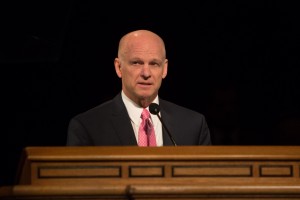
Mark Callister, associate chair of Graduate Studies in the Department of Communications, spoke about the power and blessings that come from serving with charity at BYU’s Tuesday Devotional.
He began by describing the windows of the Y-Serve office in the Wilkinson Student Center, which had been covered with personal responses from students to the question, “Why serve?”
Callister related the comments left on the windows to a talk given by Elder Dallin H. Oaks about primary reasons to serve.
The first reason some serve is to receive honor, praise or recognition. The second is for the hope of social benefits. Callister noted that Elder Oaks, of the Quorum of the Twelve, said both these reasons are self-serving.
“Moving upward along the continuum is the fear of punishment, a concern for what will happen to us if we don’t faithfully serve,” Callister explained. “Next is serving out of duty or loyalty, a motive that is commendable and will merit blessings but still falls short of the ideal. And then there is the hope for eternal reward — a ‘powerful source of motivation’ but not quite there yet.”
Callister quoted Elder Oaks as having said that the highest reason, the “more excellent way,” is charity, or “the pure love of Christ.”
The question, Callister said, then changes from “Why serve?” to “Why serve out of charity?”
A brief description of the definition and development of charity followed:
“We know that charity encompasses all godly virtues. It is not merely a kind act; it is something that we become,” Callister said. “This process of developing charity begins with a sincere, heartfelt desire. That desire leads to and grows out of a study of the life of Jesus Christ and a commitment to follow him. We learn that prayer is also critical in developing charity because charity is a divine gift that is bestowed upon us.”
To answer the question, “Why serve with charity?” Callister described an incident that demonstrated the application of this divine attribute.
Callister was called to help in the search and rescue effort of a young boy lost in the desert. Before his team left to search, a transmission came in, saying that the boy had been found. The father of the lost boy returned with him a while later.
Callister remembers the gratitude of the father for the volunteers giving up their time to help find his son. Callister “received a small glimpse into what our Heavenly Father must feel as he looks out and sees so many of his children struggling and wandering across a rapidly darkening, spiritually hostile landscape.”
“Those who go out and search for the lost ones or those who struggle, certainly offer our Heavenly Father some relief from his concern, anguish and sorrow,” Callister continued. “And his joy is full in the sheep that return to the fold or for the lambs that are comforted.”
Part of the answer to why we should serve with charity is “rooted in God’s infinite love for his children and his desire that his children experience love,” Callister explained.
Serving with the pure love of Christ affects the lives of those who are served.
Callister told of another experience when prophet Spencer W. Kimball reached out to him personally. The prophet was at BYU—Hawaii, where Callister was then a student. Callister was struggling with his relationship with God.
Callister said that as he was leaving the university, Spencer W. Kimball “suddenly stopped and turned and headed right for me. The prophet grabbed my hand, gave me a hug and kissed me on my cheek, and then looked me in the eyes and said, ‘I love you.'”
Callister said he learned that “as we strive to follow the Savior, and as we fervently pray for charity, our service undergoes a remarkable change. We begin to feel his love more keenly for those we serve, and we feel his love for us as we serve, and the outcome can be marvelous.”
Callister closed by sharing the story of Ezekiel, who walked through a river that rose to his ankles, knees and eventually higher than he could cross over without having to swim.
“My prayer would be that we might desire with all our hearts to swim in such waters, not ankle or knee deep, but experience waters to swim in. This is only possible to the extent that we follow the Savior, in faith and obedience and pray with all our hearts that he might bestow his love upon us, that we might feel those living waters of the Spirit, of the pure love that flows to us from our Heavenly Father and his Son,” Callister said.
Callister compared those high-river waters to being immersed in serving with charity.
“They desire that we direct these waters to others through our Christlike service,” Callister said. “This is why we serve out of charity.”




